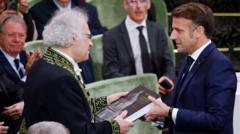The Dictionnaire de l’Académie Française, an extensive undertaking that began forty years ago, has finally reached its completion, with the ninth edition recently presented in Paris. Housed in the historic Collège des Quatre-Nations, the unveiling was attended by President Macron and the 40 esteemed members of the French Academy, known as immortels, tasked with preserving and refining the French language since 1635.
While the Academy's mission has been to “render our language pure and eloquent,” the lengthy publication timeline—which began in 1694—has raised questions about the dictionary’s relevance in a rapidly changing linguistic landscape. Critics, including a collective of linguists from Liberation, argue that despite the admirable effort, the outcome has been rendered “perfectly useless” due to significant delays.
This latest edition replaces the previous one from 1935 and introduces 21,000 new entries, aiming to encapsulate linguistic developments from the 1950s onward. However, many of the terms included often feel dated, as even some additions from the late 20th century have already lost their applicability. Common contemporary terms like tiktokeur, smartphone, and vlog are glaring omissions, sparking concerns about the dictionary's ability to keep pace with current language trends.
Moreover, though prominent concepts such as gender-specific job titles have been addressed in this edition, earlier sections fail to reflect these changes, exhibiting the Academy's historically conservative stance. The dictionary maintains a narrow definition of marriage, outlining it strictly as a union between a man and a woman, ignoring modern interpretations that reflect societal shifts in France.
As the debate over the dictionary’s efficacy rages on, discussions for the next edition are already in the works. Under the leadership of writer Amin Maalouf, the committee meets weekly to determine emerging definitions, with some members actively advocating for the inclusion of long-lost words to better capture the nuances of modern French. However, for now, many are left questioning how a resource steeped in tradition can effectively serve as a reference in an age of digital dictionaries that adapt more fluidly to language evolution.






















